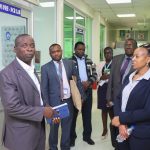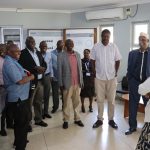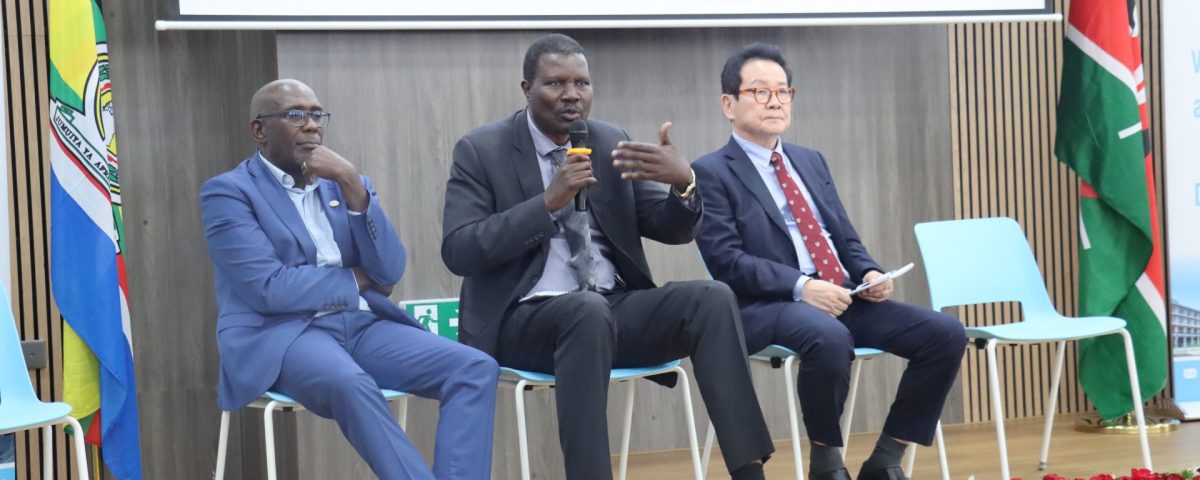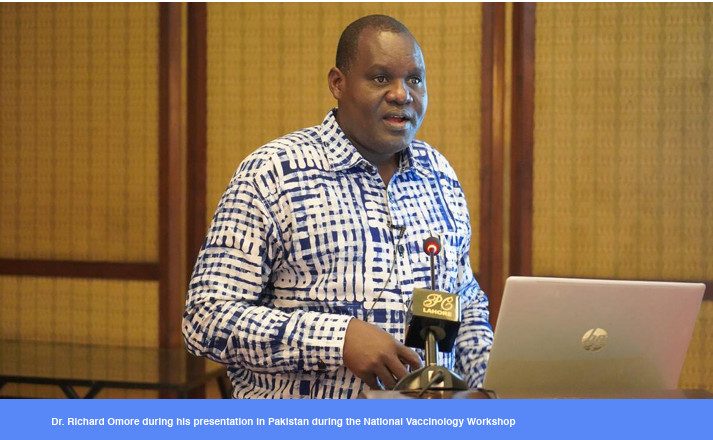
Canada Seeks to Strengthen Research Ties with KEMRI
August 6, 2025
KEMRI Board of Directors Tours Western Region Research Facilities
August 13, 2025Fight Against Infectious Diseases Intensifies as KEMRI Joins Kenya – Korea Deliberations on Bio-Vaccine Research

In yet another demonstration of its relentless advocacy for better community health through strategic partnerships, the Kenya Medical Research Institute (KEMRI) registered a notable presence in a high-level, international conference on biotechnology and vaccine research. Held on 7th August 2025 at the Kenya Advanced Institute of Science and Technology (Kenya-AIST) campus, the conference was a collaborative effort between the host institution, the Korea Advanced Institute of Science and Technology (KAIST), and the International Vaccine Institute (IVI). The event aimed to address the burden of infectious diseases in Africa by fostering stronger collaborations and driving innovation.
The Council Chairman, Kenya-AIST, Prof. Emmanuel Mutisya in his opening remarks emphasized that infectious diseases is a burden in Kenya, region and Africa. Despite Africa’s significant progress in public health, Prof. Mutisya noted, infectious diseases such as malaria, Tuberculosis and pandemics like COVID-19 continue to claim lives, strain public health and hinder socio-economic transformation due to weak vaccine development systems. With Africa’s heavy reliance on imported vaccines and COVID-19 as a wake-up call, he stated that there was a need to enhance local vaccine research, development and manufacturing capabilities as a remedy to this.
On his part, KEMRI’s Ag. Director General, Prof. Elijah Songok, highlighted key areas of potential collaboration between Kenya and Korea during his remarks on the Institute’s history and strategic direction. These areas include skill development, vaccine technology transfer, research and development, regulatory capacity, and access to finance. Acknowledging the current financial constraints as a significant hurdle in KEMRI’s efforts to fulfill its mandate, Prof. Songok outlined the Institute’s plans to navigate these challenges while continuing to advance its core agenda.


“At KEMRI, we are committed to championing the ACHIEVE programme to advocate for local funding that will support vaccine research, development, and manufacturing.” the DG said as one of the panelists tasked with addressing the potential areas of collaboration between the two countries.
“This feat can only be achieved through a robust and inclusive ecosystem of partnerships that bring together all stakeholders. This conference today is therefore a critical space, not only to replicate what has been achieved by Kenya, the continent, and the world, but also to ignite new collaborative pathways for training, research and development, and innovation in vaccine development in the continent,” Prof. Mutisya said. He further urged the stakeholders to use the opportunity to exchange ideas, share areas of collaboration, build trust and share commitment.
In his keynote remarks, Dr. Jerome Kim, Director General of IVI, reaffirmed IVI’s commitment to supporting lowermiddle-income countries by building their capacity through initiatives such as the annual IVI International Vaccinology Course, a WHO-backed program designed to impart knowledge and practical skills in vaccine science and development.
Dr. Kim also mentioned plans to launch IVI Kenyan country office, which will serve as a strategic point in advancing vaccine capabilities in Africa. “This office not only presents IVI’s new physical presence in Kenya, but also our strong commitment to advancing vaccine development and manufacturing across the African continent,” Dr. Kim said.


The Cabinet Secretary, Ministry of Information, Communications and the Digital Economy, Hon William Kabogo, through a speech delivered by the Principal Secretary in the State Department of Science, Research and Innovation, Prof. Shaukat Abdulrazak, said that Kenya and Africa should learn from history and develop clear structures to assure itself a better future in health.
“The lessons of COVID-19 pandemic were sovereign and instructive. The global health architecture is only as strong as its weakest link, and in that moment, Africa was reminded of the urgency to invest in vaccine self reliance, local manufacturing and indigenous research capacity. This conference is a strategic response to global call for equity, preparedness, and resilience. It is the step that Africa will no longer be passive in the life science revolution. Kenya in particular is determined to position itself as the regional centre of excellence in biotechnology, vaccine development and digitally-driven health innovation,” remarked the CS.
Prof. Songok also decried the lack of ownership of the research output affecting the African beneficiaries of donor funds. He subsequently called for a bold, historical shift in how African research institutions and governments operate henceforth. “Our major problem in Africa is ownership. The issues of IP, the issues of samples, the issues of data, the issues of communication, and setting priorities have all been a challenge. We need to change, we will not continue as usual. And not continuing as usual is for us to get our own funds. Then we could be able to drive our own agenda. Then we can be able actually own the rights, and this ACHIEVE gives us a good way forward,” he asserted, addressing a gathering of policymakers, research scientists, and local and international partners.
Prof. Songok was the team lead of the KEMRI delegation made up of research scientists who are actively involved in vaccine-related research and drawn from various Centres.



